
Tun Abdullah bin Ahmad Badawi is a Malaysian retired politician who served as the fifth Prime Minister of Malaysia from 2003 to 2009. He was also the sixth president of the United Malays National Organisation (UMNO), the largest political party in Malaysia, and led the governing Barisan Nasional (BN) parliamentary coalition. He is informally known as Pak Lah, Pak meaning 'Uncle' or 'Sir', while Lah is taken from his name 'Abdullah'. He was also a Member of Parliament (MP) for Kepala Batas for eight consecutive terms, from 1978 to 2013. During the later part of Abdullah's administration, his government faced criticism for economic policies and performance, including concerns about inflation and the rising cost of living.
The Malay language has a complex system of styles, titles and honorifics which are used extensively in Brunei Darussalam, Malaysia and Singapore.
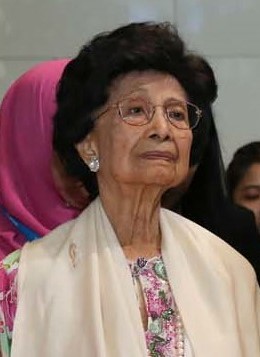
Tun Dr. Siti Hasmah binti Haji Mohamad Ali is married to Mahathir Mohamad, the 4th and 7th Prime Minister of Malaysia and former chancellor of the Multimedia University (MMU). She played the role of Spouse of the Prime Minister of Malaysia from July 1981 to October 2003 and from May 2018 to March 2020 for almost 24 years. She is the oldest-living person of the role.
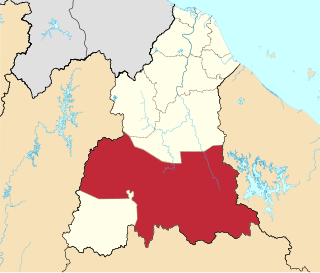
Gua Musang is a town, district and parliamentary constituency in southern Kelantan, Malaysia. It is the largest district in Kelantan. Gua Musang is administered by the Gua Musang District Council. Gua Musang district is bordered by the state of Pahang to the south, Terengganu to the east, Perak to the west and the Kelantanese districts of Kuala Krai and Jeli to the north. It is a small railway town about 140 km south of state capital Kota Bharu. Gua Musang is represented by Mohd Azizi Abu Naim in the Dewan Rakyat. The town lies on the KTM East Coast Line, from Tumpat, near the border with Thailand, to Gemas, Negeri Sembilan.

Madu Tiga is a 1964 Singaporean black-and-white Malay-language romantic comedy film directed by and starring P. Ramlee, Sarimah, Ahmad Nisfu and M. Rafiee.

Nujum Pak Belalang is a 1959 Singaporean Malay-language black-and-white comedy film directed by and starring P. Ramlee. The film is styled as a fairytale and is loosely based on a Malay folk tale.

Mohd. Ali bin Mohd. Rustam is a Malaysian politician who has served as the 7th Yang di-Pertua Negeri of Melaka since June 2020. He served as the 9th Chief Minister of Melaka from December 1999 to May 2013, Deputy Minister of Health from November 1996 to December 1999, Deputy Minister of Transport from May 1995 to November 1996, Member of Parliament (MP) for Batu Berendam from April 1995 to November 1999, Member of the Malacca State Legislative Assembly (MLA) for Bukit Batu from March 2004 to May 2013, for Paya Rumput from November 1999 to March 2004, for Sungai Udang from October 1990 to April 1995 and for Ayer Molek from August 1986 to October 1990. He was a member of the United Malays National Organisation (UMNO), a component party of the Barisan Nasional (BN) coalition.
Syed Ahmad bin Syed Mahmud Shahabuddin was a Malaysian politician. He was the Menteri Besar of Kedah from 1967 to 1978 and the fifth Yang di-Pertua Negeri (Governor) of Melaka state from 1984 until 2004, the longest-serving governor of Malacca.
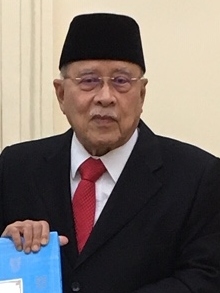
Abdul Rahman bin Abbas is a Malaysian politician who had served as the 7th Yang di-Pertua Negeri of Penang from 1 May 2001 to 30 April 2021. He is a former politician from the United Malays National Organisation (UMNO). Abdul Rahman was first appointed to the governorship by the Yang di-Pertuan Agong in May 2001 and was reappointed six times, in 2005, 2009, 2011, 2013, 2015, and 2017 for a total of 20 years, thus becoming the longest-serving governor in Malaysian history.

Mohd Khalil bin Yaakob is a Malaysian politician who served as the 6th Yang di-Pertua Negeri of Malacca from June 2004 to June 2020, 12th Menteri Besar of Pahang from August 1986 to May 1999, Minister of Information in the Barisan Nasional (BN) administration under former Prime Minister Mahathir Mohamad from December 1999 to March 2004 and Member of Parliament (MP) for Kuantan from November 1999 to March 2004. He is a member of the United Malays National Organisation (UMNO), a component party of the ruling BN coalition.

Ahmad Zaidi Adruce bin Muhammed Noor was a Malaysian politician who served as the 5th Yang di-Pertua Negeri (Governor) of Sarawak. He was the longest-serving governor in consecutive terms from a single appointment, from his inaugural in 1985, to his death in 2000. He was also remembered as the first Sarawakian Bumiputera to receive a MA Degree from a British university.

Hang Tuah is a 1956 Singaporean Malay-language historical drama film directed by Phani Majumdar. It is the first Malay film to be fully shot in Eastman colour film. It was released in Singapore by Shaw Organisation on 28 January 1956. The film was based on the legendary Admiral Hang Tuah of Malacca and his 4 sworn brothers; Hang Jebat, Hang Kasturi, Hang Lekir and Hang Lekiu. This film received the award for 'Best Musical Score' at the 3rd Asian Film Festival in Hong Kong in 1956 and an official screening at 7th Berlin International Film Festival in 1957, where it was nominated for the Golden Bear.
Sri Maharaja Sang Sapurba Paduka Sri Trimurti Tri Buana, (1245–1316) also known as Sri Nila Pahlawan, is a figure in the Malay Annals, highly revered as the legendary great ancestor of some of the major dynasties of the Malay world: Singapura, Malacca, Pahang, Johor, Perak, Kelantan, Terengganu and Siak Sri Indrapura. Legend has it that after his accession to Seguntang Hill with his two younger brothers, Sang Sapurba enters into a sacred covenant with Demang Lebar Daun the native ruler of Palembang, which laid the basis of the proper relationship between the Malay rulers and the subjects. The legendary sword believed to be carried by the king, the Cura Si Manjakini, is now formed part of the regalia of Perak Sultanate, whose rulers are said directly descended from the king. The details of Sang Sapurba stories are mainly composed of folklore and legends, and thus his historical existence is debated and disputed by modern historians. Even so, as De Jong argued in her article The Character of Malay Annals, the stories of the Malay Annals could have been realistically mixed with the historical figures and events.
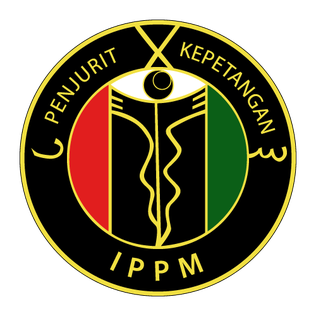
Istiadat Pewaris Penjurit-Kepetangan Melayu or formerly known as Ilmu Persilatan Penjurit-Kepetangan Melayu, shortform IPPM is one of the oldest original known to date Malay martial art form or called 'Silat' in existence which has been heritage from one generation to another. Descended from the first ruler of the Malayapura Kingdom, King Adityawarman whom is also known as Seri Maharaja Diraja which to a later stage sparked the start of Minangkabau history in Pagaruyung Kingdom, Sumatra, Indonesia. These story has been greatly narrated in most of old Malay Literature including in of the most reliable sources to date called Sulalatus al-Salatin or better known as The Malay Annals (Malay: Sejarah Melayu). The manuscript begin with the stories of Wan Malini and Wan Empuk whom was presented with 3 adopted princes right after when their rice fields was magically expelling gold. These 3 princes was later mark as the kickstart for the next 3 big empires in Malay Archipelago. Those empires were the Kingdom of Majapahit, The Malacca Sultanate and the Pagaruyung Kingdom around the 12th century.

The Indonesian Malaysians are Malaysian citizens of Indonesian ancestry. Today, there are many Malaysian Malays who have lineage from the Indonesian archipelago and have played an important role in the history and contributed to the development of Malaysia, they have been assimilated with other Malay communities and are grouped as part of the foreign Malays or anak dagang in terms of race. The Malaysian census does not categorize ethnic groups from the Indonesian archipelago as a separate ethnic group, but rather as Malay or Bumiputera.

Sakaran Mohd Hashim bin Dandai was a Malaysian politician.
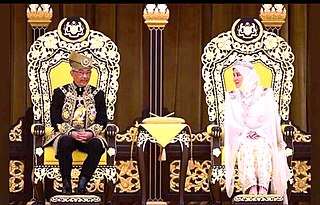
The installation of Al-Sultan Abdullah Ri'ayatuddin Al-Mustafa Billah Shah ibni Almarhum Sultan Haji Ahmad Shah Al-Musta'in Billah as the sixteenth Yang di-Pertuan Agong of Malaysia took place in a Malay Royal Ceremony at the Balairong Seri, Istana Negara, Kuala Lumpur on Tuesday, 30 July 2019 at 10 a.m. He was elected earlier by the Malay Rulers in the 251st Special Meeting of Conference of Rulers which was held at Istana Negara on 24 January 2019. The meeting was held upon the abdication of the previous Yang di-Pertuan Agong, Sultan Muhammad V of Kelantan who abdicated from his post on 6 January 2019. Abdullah held the position for a period of 5 years beginning on 31 January 2019.
Datuk Seri Utama Haji Sulaiman bin Md Ali is a Malaysian politician who has served as Member of the Malacca State Legislative Assembly (MLA) for Lendu since May 2013. He served as the 12th Chief Minister of Malacca from March 2020 to his resignation in March 2023, Deputy Member of the Malacca State Executive Council (EXCO) in the Barisan Nasional (BN) state administration under former Chief Minister and former Member Idris Haron from May 2013 to the collapse of the BN state administration in May 2018. He is a member, State Secretary of Malacca and Division Deputy Chief of Masjid Tanah of the United Malays National Organisation (UMNO), a component party of the BN coalition.
Ahmad Fuzi bin Abdul Razak is a Malaysian diplomat who has served as the 8th Yang di-Pertua Negeri of Penang since 1 May 2021.
Satya Baharom, known professionally as Saadiah was a Malaysian actress and director, who was famous in the 1950s and 1960s during the golden era of the Malay films.













